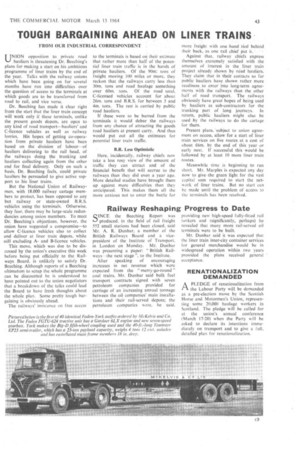TOUGH BARGAINING AHEAD ON LINER TRAINS
Page 45

If you've noticed an error in this article please click here to report it so we can fix it.
FROM OUR INDUSTRIAL CORRESPONDENT
UNION opposition to private road 1/4.1 hauliers is threatening Dr. Beeching's plans for making a start on his ambitious programme of liner trains by the end of the year. Talks with the railway unions which have been going on for several months have run into difficulties over the question of access to the terminals at which goods are to he transferred from road to rail, and vice versa.
Dr. Beeching has made it clear right from the start that the liner train concept will work only if these terminals, unlike the present goods depots, are open to any kind of road transport—hauliers' and C-licence vehicles as well as railway lorries. His hopes of getting co-operation from private hauliers have been based on the division of labour—of hauliers delivering to the rail head, of the railways doing the trunking and hauliers collecting again from the other end for final delivery. Only on such a basis, Dr. Beeching feels, could private hauliers be persuaded to give active sup port to his liner trains. • But the National Union of Railwaymen, with 18,000 railway cartage members to protect, has been opposed to any but railway or state-owned B.R.S. vehicles using the terminals. Otherwise. they fear, there may be large-scale redundancies among union members. To meet Dr. Beeching's objections, however, the union have suggested a compromise—to allow C-licence vehicles also to collect and deliver at liner train depots, while still excluding Aand 8-licence vehicles.
This move, which was due to be discussed by the union's executive this week before being put officially to the Railways Board, is unlikely to satisfy Dr. Beeching. Although reports of a Beeching ultimatum to scrap the-whole programme can be discounted he is understood to have pointed out to the union negotiators that a breakdown of the talks could lead the Board to have fresh thoughts about the whole plan. Some pretty tough bargaining is obviously ahead.
The railways' insistence on free access to the terminals is based on their estimate that rather more than half of the potential liner train traffic is in the hands of private hauliers. Of the 90m: tons of freight moving 100 miles or more, they reckon that the railways carry less than 30m. tons and road haulage something over 60m. tons. Of the road total. C-licensed vehicles account for about 26m. tons and B.R.S. for between 3 and 4m. tons. The rest is carried by public road hauliers.
If these were to be barred from the terminals it would debar the railways from any chance of attracting the goods road hauliers at present carry. And thus would put out all the estimates for potential liner train traffic, B.R. Less Optimistic, Here. incidentally, railway chiefs now take a less rosy view of the amount of traffic they can attract and of the financial benefit that will accrue to the railways than they did even a year ago. More detailed studies have brought them up against more difficulties than they anticipated. This makes them all the more anxious not to enter the battle for
more freight with one,hand,tied behind. their back,. as one rail chief Put it.
Against that, railway chiefs express themselves extremely satisfied with the amount of interest in the, liner train project already shOwn by. Toad hauliers. They claim that in Their contacts so far public hauliers have shown rather more readiness to enter" into long-term agreements with the railways than the other half of rbad transport. The railways obviously have great hopes of being used by hauliers as sub-contractors for the trunking part of long journeys. In return, public hauliers might also be used by the railways to do the cartage for them.
Present plans. 'subject to union agreement on access, allow for a start of liner train services on five routes at a cost of about E6m. by the end of this year or early next. If successful this would be followed by at least 10 more liner train routes.
Meanwhile time is beginning to run short. Mr. Marples is expected any day now to give•the green light for the vast capital sum required to start the network of liner trains. But no start can be made until the problem of access to the terminals has been resolved.








































































































































